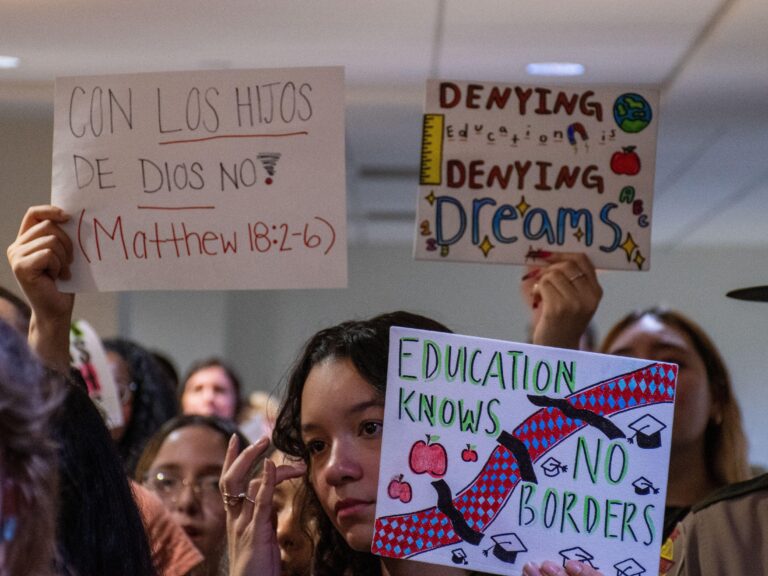In the United States, students without legal immigration status currently have the right to attend public schools, a policy upheld for decades as part of a commitment to educational access for all children. However, as political debates over immigration policies intensify, questions arise about whether former President Donald Trump might attempt to roll back these protections if he returns to office. This article explores the legal landscape surrounding the education rights of undocumented students and examines the potential implications of any policy shifts under a renewed Trump administration, shedding light on a contentious issue at the intersection of immigration and education.
Students without Legal Status and Their Right to Public Education
The landmark 1982 Supreme Court decision in Plyler v. Doe guarantees that children, regardless of their immigration status, cannot be denied access to public education. This ruling has ensured that thousands of undocumented students attend schools nationwide, allowing them to pursue academic opportunities on an equal footing with their peers. Public school districts have since been mandated to enroll students without requiring proof of citizenship, fostering inclusive classrooms that reflect the diverse fabric of American society.
However, recent political discourse has raised questions about the future of these protections. The Trump administration proposed several immigration policies aimed at stricter enforcement, stirring concerns among immigrant communities and educators about potential rollbacks. Key points include:
- Potential policy amendments that might introduce enrollment barriers tied to immigration status.
- Challenges faced by school systems in safeguarding student privacy amid increased immigration scrutiny.
- Legal battles expected as advocacy groups vow to defend existing education rights for undocumented minors.
Historical Background and Legal Precedents Protecting Undocumented Students
Since the landmark 1982 Supreme Court ruling in Plyler v. Doe, undocumented students have been constitutionally protected under the Equal Protection Clause of the Fourteenth Amendment. This precedent explicitly prohibits public schools from denying access to education based on immigration status, mandating that all children within U.S. borders receive a free public education regardless of their legal standing. Over the decades, this ruling has served as the cornerstone for educational policies nationwide, reinforcing that school attendance is a right, not a privilege tied to immigration documentation.
Additional legal safeguards complement Plyler v. Doe, such as state laws that bolster access and privacy protections for undocumented students. For example, many states enforce strict confidentiality regarding studentsŌĆÖ immigration information, preventing schools from cooperating with federal immigration enforcement without due process. Below is a simplified summary of key protections:
- Equal access: Denial of education based on immigration status is unconstitutional.
- Privacy rights: Schools cannot disclose student immigration status without consent.
- Anti-discrimination: Policies prohibit discriminatory treatment in educational settings.
| Legal Precedent | Year | Impact |
|---|---|---|
| Plyler v. Doe | 1982 | Guaranteed free public education for all children |
| FERPA Amendments | 2008 | Strengthened student record confidentiality |
| State Sanctuary Laws | Various | Limit immigration enforcement in schools |
Potential Policy Shifts Under the Trump Administration
The Trump administration has signaled a potential reassessment of policies that grant access to public education for students without legal status. While the landmark 1982 Supreme Court decision in Plyler v. Doe firmly established the right of undocumented children to attend public schools in the U.S., the current administration’s tougher stance on immigration enforcement raises questions about the future interpretation and enforcement of this ruling. Senior officials have hinted at exploring legal avenues to challenge or reinterpret the scope of this right, although no formal proposal has yet been introduced.
Possible policy shifts could involve:
- Imposing stricter verification processes at school enrollment
- Increasing coordination between school districts and immigration authorities
- Redirecting federal funding away from districts with high undocumented student populations
- Revisiting guidelines around in-state tuition and financial aid for undocumented students
Such measures, if implemented, would represent a significant departure from current practice and could provoke legal challenges, igniting a complex debate about education access, civil rights, and immigration policy enforcement.
| Policy Aspect | Current Status | Potential Change |
|---|---|---|
| Enrollment Verification | Minimal documentation required | Enhanced ID checks |
| Federal Funding | Available regardless of student status | Conditional or reduced |
| Tuition & Aid | State discretion, including aid access | Restrictions likely increased |
| Coordination with ICE | Generally limited | Expanded collaboration |
What Educators and Communities Can Do to Support Affected Students
Educators and communities are on the front line when it comes to safeguarding the rights of students without legal status. Schools must serve as safe havens where all childrenŌĆöregardless of immigration statusŌĆöcan access education without fear of deportation or discrimination. Teachers and administrators can implement inclusive policies that emphasize confidentiality and protect student information from being shared with immigration authorities. Training staff on cultural competency and immigrant rights empowers educators to recognize and address the unique challenges these students face, while fostering an environment of belonging.
Community involvement is equally vital in supporting affected students. Local organizations can offer resources such as tutoring, counseling, and legal aid to help students and their families navigate uncertainties. Parents and advocates should be encouraged to collaborate with schools to demand transparency and accountability in policy enforcement. Below is a brief guide highlighting key actions communities and educators can undertake:
- Host workshops on immigrant rights and school policies
- Establish clear communication channels between families and school staff
- Create support networks for undocumented students within schools
- Advocate for local laws that protect student privacy and access to education
| Action | Benefit |
|---|---|
| Confidential Student Records | Prevents unauthorized data sharing |
| Inclusive Curriculum | Fosters understanding and empathy |
| Legal Aid Partnerships | Offers critical support and guidance |
| Community Forums | Strengthens advocacy and awareness |
Wrapping Up
As the debate over immigration policy continues to unfold, the question of whether students without legal status will retain their right to attend public schools remains critical. While current laws protect these studentsŌĆÖ access to education, any potential changes under the Trump administration could have far-reaching implications for families and communities across California and the nation. Observers and advocates alike will be watching closely to see if and how federal policies shift, and what that means for the educational rights of undocumented children moving forward.







